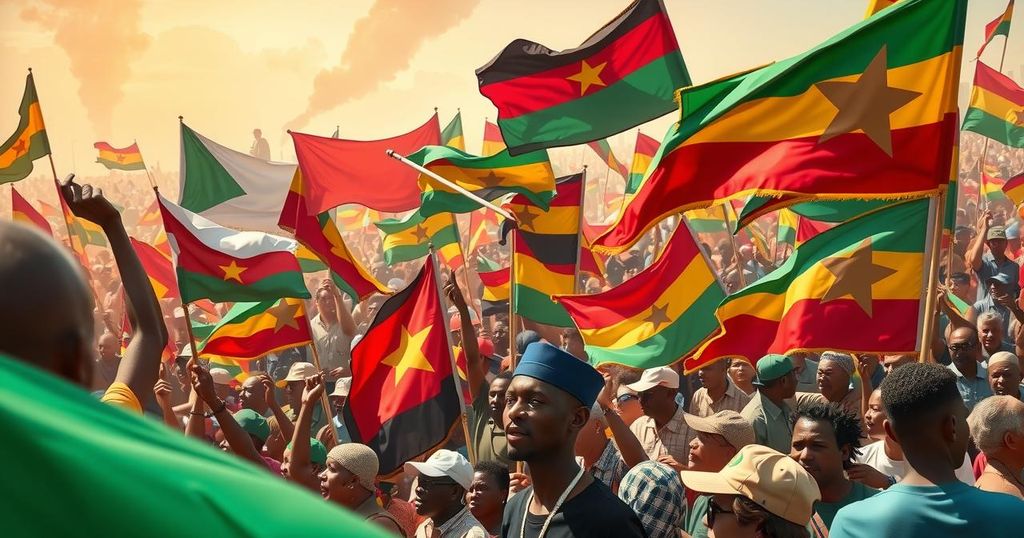Massive Support for Burkina Faso Military Junta Amidst Alleged Coup and Criticism

Thousands protested in Ouagadougou in support of Burkina Faso’s military junta after an alleged coup attempt. The junta claimed to have thwarted a plot linked to Ivory Coast amid criticism from U.S. officials about resource management. Despite widespread security challenges and accusations of human rights abuses, citizens rallied behind Capt. Ibrahim Traore, viewing him as a symbol of hope in Africa, yet the political climate remains precarious.
In a remarkable display of support, thousands gathered in Burkina Faso’s capital, Ouagadougou, on Wednesday, rallying behind the military junta following an alleged coup attempt over the past week. The junta’s assertions claim that they thwarted a significant conspiracy to unseat Capt. Ibrahim Traore, with allegations tying the plotters to neighboring Ivory Coast. Amid this backdrop, criticism of Traore’s leadership by U.S. military officials has further fueled the tensions.
Gen. Michael Langley, the head of U.S. military operations in Africa, made contentious remarks during a recent Senate committee hearing, accusing Traore of misusing Burkina Faso’s rich gold resources for the junta’s benefit rather than that of the country’s citizens. Such comments have resonated deeply, as the protestors embraced their support of the junta, chanting slogans and displaying banners directed at U.S. officials. Notably, some displayed the phrase “slave” scrawled on a photograph of Langley.
The protest at Ouagadougou’s Place de la Revolution was marked by fervor and defiance. Among the attendees was musician Ocibi Johann, who expressed skepticism towards Langley’s allegations. He reflected on historical precedents, stating, “Colin Powell lied, Iraq was destroyed, Gaddafi was killed… this time, their lies won’t affect us.” The protestors emphasized their opposition to what they termed as economic exploitation, articulating a desire for autonomy from foreign interference.
The context is critical; since last year, U.S. military bases in Niger were closed following the cessation of a military agreement after Niger’s own coup. This withdrawal has shifted the security landscape as Burkina Faso, Niger, and Mali grapple with longstanding insurgent threats. Increasingly, these nations have forged ties with Russia, seeking military support to counter resilient jihadist groups operating in the region.
The desperation for security has led to a rise in nationalistic sentiments. Following his ascension to power in 2022, Capt. Ibrahim Traore was viewed as a beacon of hope for many, particularly the youth longing for change. Attendee Sekou Ansumariam Dukaly, who traveled from Liberia to attend the rally, remarked on Traore’s symbolic significance, saying he represents “hope for Africa, hope for Black people, hope for all freedom fighters around the globe.”
However, the junta has faced a barrage of challenges since its takeover. The burgeoning insurgency has left over 60% of the country reportedly beyond government reach, leading to a humanitarian crisis with millions displaced and in dire need of aid. Compounding these issues are allegations of serious human rights abuses by the military and allied militias, including unlawful killings during counterinsurgency operations.
Moreover, rights organizations assert that the junta has instituted a climate of censorship, stifling dissent. Reports indicate that those who challenge the status quo risk abduction, imprisonment, or forced military recruitment, creating a grim atmosphere for civil liberties in the country. Thus, the situation remains extremely complex, fraught with both nationalistic fervor and deep-rooted socio-political challenges.
The recent rally in Ouagadougou highlights the complexity of Burkina Faso’s political landscape, as citizens express fervent support for the military junta despite ongoing allegations of human rights abuses and criticism from international officials. Capt. Ibrahim Traore’s leadership is both revered and met with significant challenges, as his government struggles to provide security and stability in a nation facing a severe humanitarian crisis. The interplay of local pride, foreign criticism, and the struggle against insurgency underscores the nuanced dynamics at play in the Sahel region.
Original Source: apnews.com







